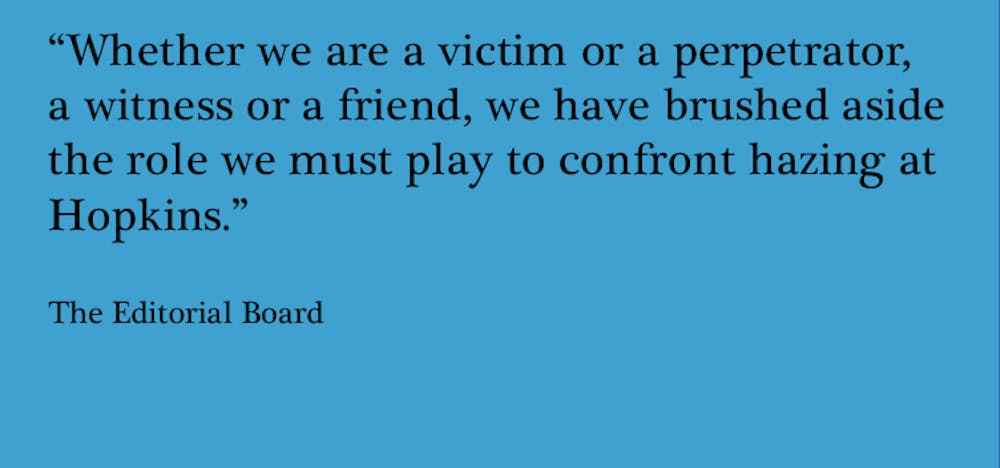This past week was Hazing Prevention Week, an annual week hosted by the Office of Fraternity and Sorority Life, Office of Multicultural Affairs, Hopkins Athletics and the Office of Student Leadership and Involvement. This week of activities included events such as a midnight breakfast at The LaB, the men’s soccer game, a movie screening as well as a keynote speaker.
Hazing in its many forms is pervasive on college campuses nationwide. Hopkins is no exception. Hazing here is not limited to Greek life but can be found in a number of student groups and sports teams.
Despite the prevalence of hazing, the University seems to have taken little direct action against it. Hazing Prevention Week is characterized by activities like trivia and film screenings, which the Editorial Board believes trivializes the gravity of the situation.
These attempts undermine any real progress in critically assessing the prevalence of hazing on campus. Much of the student body on the whole is complicit in this culture by remaining silent. Whether we are a victim or a perpetrator, a witness or a friend, we have brushed aside the role we must play to confront hazing at Hopkins.
While Hazing Prevention Week begins the conversation, we avoid critically discussing why it occurs. Consequently, we are left to wonder if real change is even possible when it seems that Hazing Prevention Week just attempts to raise general awareness.
The University’s current approach to hazing is inadequate. A week of games and activities that promotes prevention hardly seems to be the proper response to a problem which can, at times, be a matter of life and death.
One only needs to look as far as the recent incident at the Penn State chapter of Beta Theta Pi, in which a student was killed during hazing related activities. The stakes can be too high to wait for a reactive response. Telling students “just don’t do it” is not enough.
The most effective way to address hazing would require a change in how we approach it. The University must create an atmosphere that encourages everyone to speak out. We as a student body have a responsibility to break the culture of silence.
To facilitate this, the administration must work against the stigma which restricts the discussion of hazing. This could be achieved by formally educating freshmen about the psychological motivations behind hazing.
It is important for students to understand that even an ordinary individual can begin to participate in the toxic power relationships at the root of hazing. It seems that unless those motivations are examined, potential perpetrators will not be able to see how hazing can occur and victims may see it as “normal.”
Today, Hopkins students must reconsider their relationship to hazing. We encourage students to ask themselves: Why do we perpetuate the culture of silence? Why do we participate? Student groups too must ask: is this painful tradition really worth the cost?
Editor’s note: Three members of this week’s Editorial Board are members of Greek Life.

















